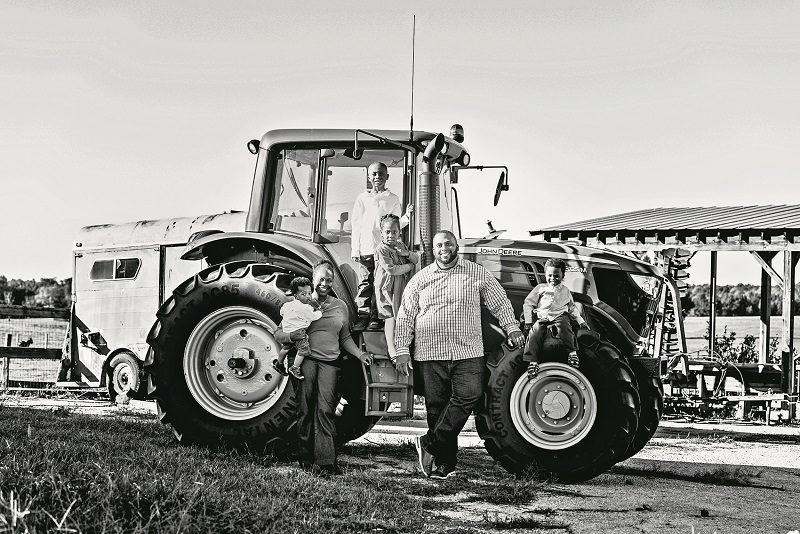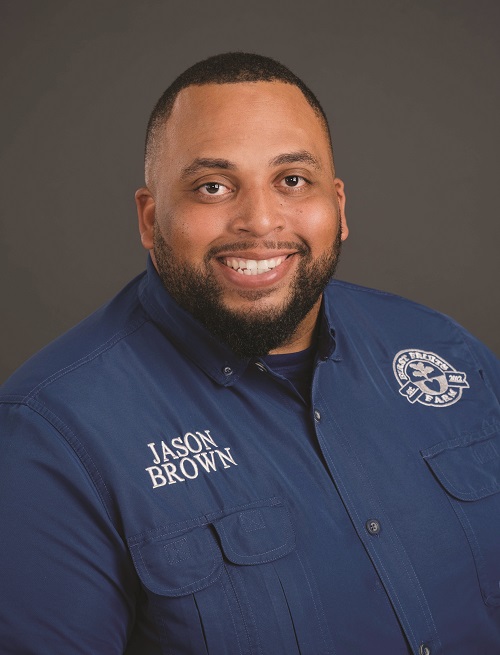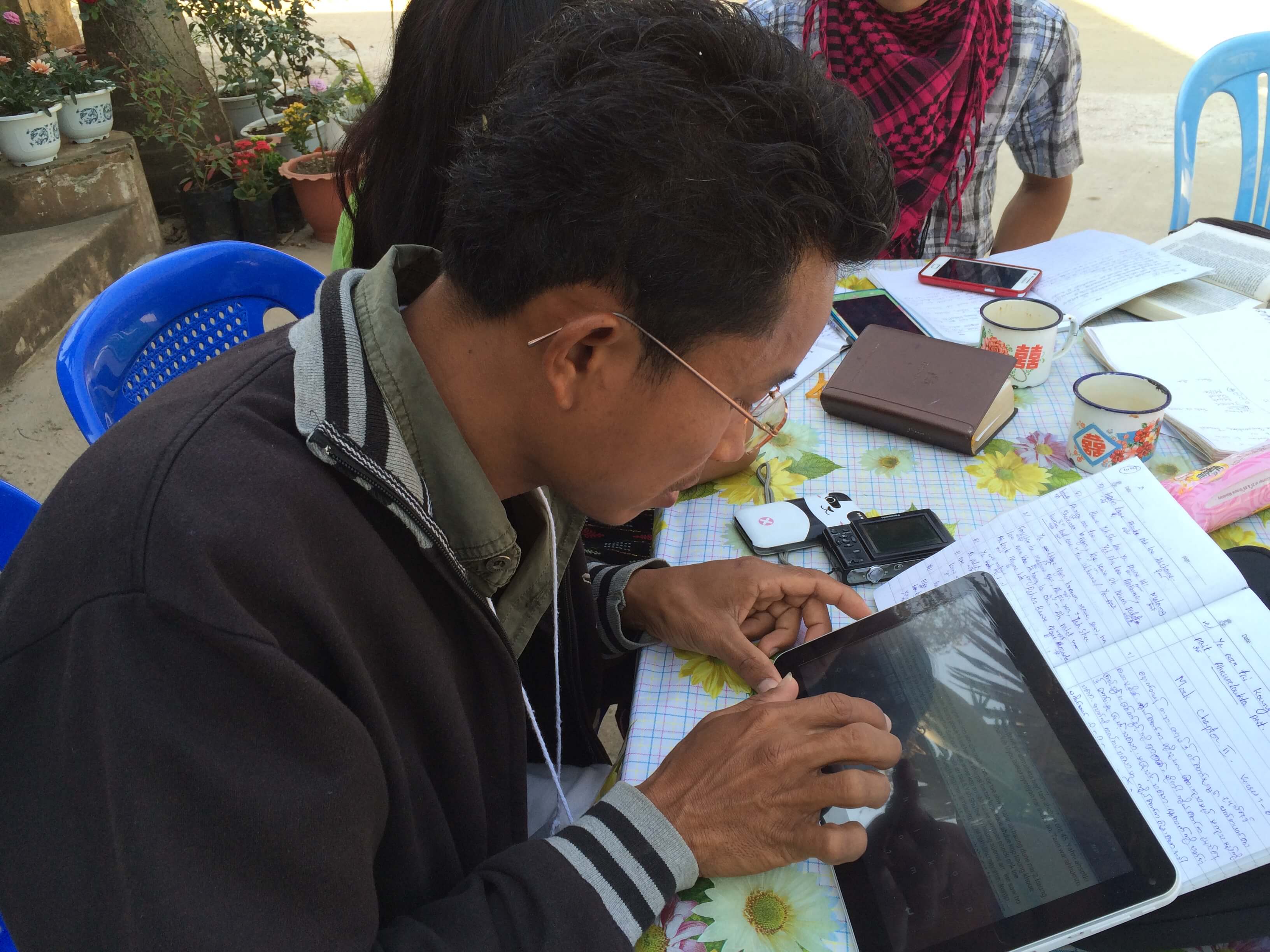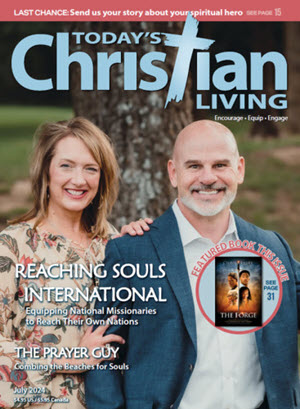An NFL Center-Turned-Farmer Tackles Hunger by Faith
By Jason Brown
Photo courtesy Jamie Thayer Jones
Faith is the substance of things hoped for, the evidence of things not seen. Faith defies logic and transcends all human understanding at times. But it’s what God calls believers to operate by, for it is impossible to please God without faith.
When God called me to be a farmer, I didn’t exactly know the level of faith that was going to be demanded of me. But one thing I was going to learn soon enough is that faith isn’t optional in farming. They go hand-in-hand like a marriage. For better, for worse, for richer, for poorer, in sickness and in health, you must persevere and continue to farm by faith.

It seemed quite simple enough. All I had to do was sow seeds in faith, and that’s just what I did. In the summer of 2014, with my limited knowledge of farming, I planted my first crop of sweet potatoes. It was just five acres, yet I was expecting 100,000 pounds to be harvested. Somehow, we were blessed with a bumper crop, and our cup literally runneth over with 120,000 pounds of sweet potatoes. They were everywhere, and they were huge. Many people had never seen sweet potatoes that large before.
It was a huge success, but this success also set me up for some unrealistic expectations. I think God was using it as a way of boosting my morale and giving me some confidence in my early days of farming. Well, it worked almost to a fault because I was beginning to think farming was easy. Everyone was congratulating me on my newfound success, and I was soaking it all in. They were giving me nicknames like the “Sweet Potato Whisperer.” No, I wasn’t talking to the sweet potatoes, but I was giving God thanks for an awesome harvest.
The oversimplified success of 2014 set me up for a rude awakening in 2015. The farm marriage in 2014 brought me better and richer, but now, all I saw was poorer and worse. Somehow, Murphy’s law came into the picture, and whatever could go wrong did indeed go wrong. First Fruits Farm experienced severe droughts in the middle of the summer. The on-time rains that irrigated my sweet potato vines the previous year literally came to a halt, leaving them stressed and panting for water. On top of that, all the local deer issued a public service announcement to be sure and visit my fields nightly for a mob crop buffet. And I’m not talking about a just a few deer — it was an army of deer that mowed down my vines, and they even dug up the small developing potatoes and ate them as well. I didn’t know what was going on, but it appears whatever favor, grace, and mercy I had from God the previous year had now turned into a curse.

Although we planted twice as many acres of sweet potatoes as the previous year, we only harvested 30,000 pounds. The small yield of this harvest in contrast with the huge success the previous year had failure written all over it. At least those were the lies beginning to echo in my ears, but it wasn’t the truth. Romans 8:28 tells us the truth in that we’re to know that all things work together for good to them that love God, to them who are called according to His purpose.
I love God. I know I was called by God to be a farmer and to feed His people. I looked at this Scripture and then I looked at my dismal crop and something still didn’t quite add up. I was utterly puzzled how a drought and an onslaught from an army of deer was supposed to work toward good. And this, my friends, was the test. My call to farming required faith, but that faith wasn’t tested until now. This was my first time going through serious troubles on the farm.
One area I was tested by faith was to change my attitude and mindset toward the 30,000-pound harvest. Instead of looking at the harvest as a curse, I should have been thanking God that He spared us those potatoes. Jesus had the right attitude when He performed the miracle of feeding 5,000 people. He didn’t focus on His lack of resources in that He only had two fish and five loaves of bread to work with. Instead, Jesus looked toward heaven and gave thanks for what He did have. In the end, God provided the increase and made sure everyone was generously fed.
Now it was my turn. I looked at my humble harvest, and then I looked toward heaven and gave thanks. “God, thank You for what You’ve allowed us to harvest here. Thank You for these 30,000 pounds of sweet potatoes. You’re the One who’s going to make sure this food goes where it’s needed. You’re the One who’s going to use these potatoes to feed the hungry, to give hope and encouragement to the poor. You’re the One who provides the increase. That’s not my responsibility. In faith, I know You’re going to do the rest.”

This step of faith isn’t easy, but it’s exactly what James asks of us. To consider trials and troubles an opportunity for great joy so we may persevere in our faith (James 1:2). When that faith is tested, our endurance has a chance to grow. We must consider because God knows we’re not robots, and He is so gracious to never take away our free will.
Since 2015, First Fruits Farm has had some good years and we’ve had some not-so-good years. I caution not to label any shortcomings as a bad year because in all of God’s creation, He saw that it was good. What would it look like for God to call something good and for me to turn right around and label it as bad? That would be highly irresponsible and exercising a lack of faith. This goes right back to adjusting our attitudes.
I challenge you to do the same and consider every trial and trouble an opportunity for growth and endurance. I challenge you to look at even the smallest of blessings in your life and give God thanks in all things.
The Tractor Miracle
I left the NFL a wealthy man, determined to handle my family’s money wisely as a good steward of the blessings God had given us. The Lord calls us to invest our time and treasure for His work, so after careful research, I invested much of our savings in what, at the time, were great prospects for reliable income. I had planned on using that money for His work so we could donate our crops to the hungry. But I had also prayed for God to make me dependent on Him. He answered that prayer in a way I hadn’t expected, as all my investments disappeared. We had enough to buy the farm, but for the rest, we’ve had to depend on faith for everything. In fact, right up to the present, we live every day by faith for His provision.
I began farming in the summer of 2014 with a borrowed, run-down Allis Chalmers tractor. It seemed like every day I had to pray to get it started. The ancient 1968 model didn’t have a cab, so one day when I was sweltering in the fields under the blistering summer sun, I got frustrated, thinking of all that I had given up to carry out this mission God had given me to feed the poor. It didn’t seem fair that the farmers around me had such nice tractors. In my frustration, I boldly called out to the Lord. I detail my exchange with God in my book, Centered: Trading Your Plans for a Life That Matters:
“Call it a prayer. Call it a tantrum. Call it whatever you want. But I was hurting. I was tired. And I was calling out to my heavenly Father — telling my Daddy what I needed.
“God, by this time next year, You’re going to bless me with one of those tractors,” I said. “It’s going to need at least a” — I thought for a moment— “a hundred horsepower, because this is a big farm! And it’s going to need some sort of four-wheel drive because of all the hills around here!”
And as I swatted away a horsefly and thought about the heat, I added that I wanted it to be enclosed and have air-conditioning.
“God asked me to cry out to Him. Well, that’s what I did that afternoon: I cried out to Him, cried out like a baby. And finally, after my energy had been spent and my tears had dried, I stopped.
“Amen,” I said, “And I went back to work.”
Months later, out of the blue, a man emailed me, asking me if I needed any equipment, but I brushed it off and didn’t respond. A couple of weeks later, he wrote again. This time, my wife, Tay, convinced me to write back and at least hear him out. He was serious. My story, which had made the rounds in various news stories, had touched him deeply, and he really did want to help. He asked me what I needed. I explained that I needed a tractor.
“A tractor!” he said. “Of course! You’d need a good tractor with as big a farm as you have. A really good tractor, a reliable one. Something like a John Deere,” he said. “At least a hundred-horsepower one, I’d imagine.”

“It gets pretty hot out there, too, doesn’t it?” he added, barreling on. Before I could answer, he said, “Yep, it needs to have an enclosed cab. With air-conditioning.
“He started rattling off not just what my tractor needed but what I’d asked for, as if he’d been standing beside me in the field that day.”
I had a hard time believing that there wasn’t a catch to his offer. I asked him if he wanted me to make an appearance, give a speech, sign some autographs, endorse a product, or something.
“Jason, God told me to reach out to you and ask if you needed any help with equipment,” he said. “The only obligation you have is to continue being obedient to the Holy Spirit, the same way I’m being obedient to the Holy Spirit right now.”
Soon after, the tractor was delivered to the farm just as described — and with a full tank of fuel. In summer 2014, I had asked God for a new tractor within a year. But just six months later, it was mine. God not only answered my exact prayer, but six months early!
“At the beginning of 2014, I didn’t have a tractor, didn’t have a crop, didn’t even have the money for seed. I didn’t have anything but a hope and a prayer … and a God who could do miracles.”

Jason Brown grew up in Henderson, North Carolina. He attended the University of North Carolina, where he played both guard and tackle before moving to center. He was drafted in the fourth round by the Baltimore Ravens in 2005. Brown became a free agent in 2009 and was signed by the St. Louis Rams for $37.5 million, making him the highest-paid center in the league. He was again a free agent three years later, but rather than signing a new contract, Brown left the NFL and bought a 1,000-acre farm near Louisburg, North Carolina. Brown has been farming full-time since 2013 and gives nearly everything he grows (mostly sweet potatoes) to the poor. He shares his story in his book, Centered: Trading Your Plans for a Life That Matters, written with Paul Asay. Brown and his wife, Tay, have been married since 2003 and have eight children.








